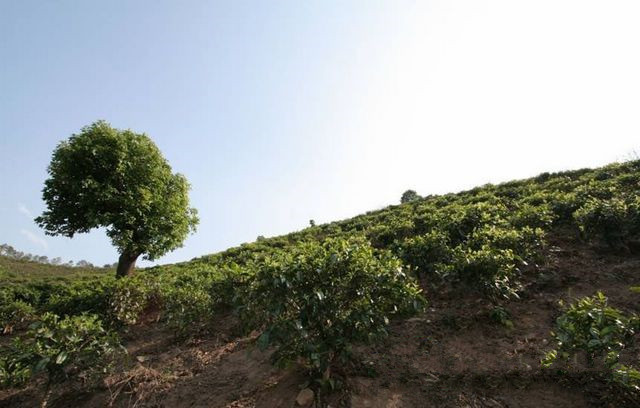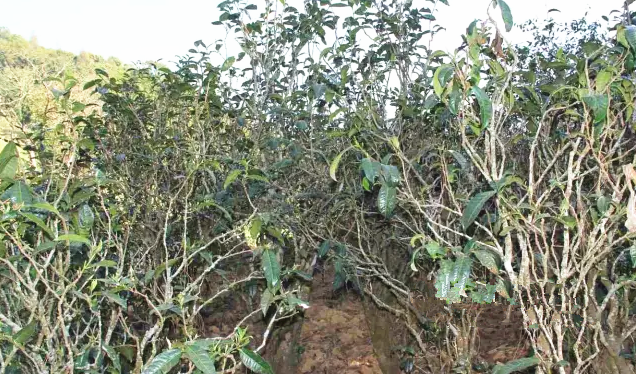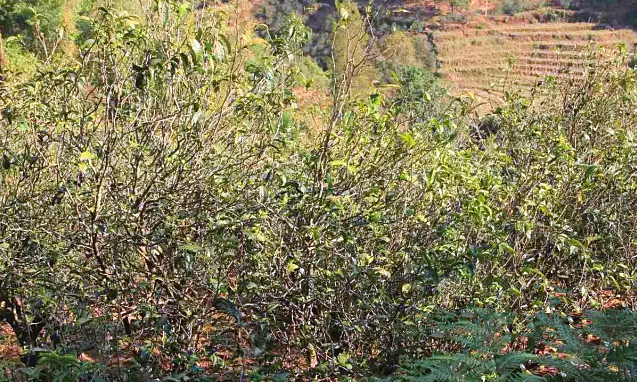Haigong Village Tea Plantation of Dongbanshan Mountain in Mengku Town, Lincang
Chinese Name: 勐库东半山:亥公村
English Name: Haigong Village of Dongbanshan Mountain in Mengku Town, Lincang
Haigong (亥公) is the northern gateway to the Shuangjiang River and serves as the entrance to Mengku Town. The Haigong Mountains (亥公山脉) act as a boundary between Lincang and Mengku, featuring a significant elevation difference of nearly 1,000 meters from the Heigong Mountains to the Mengku Dazi. The area is home to over 3,000 acres of organic tea gardens, making it the largest tea-growing region in Mengku. Major tea factories in Shuangjiang prioritize Haigong’s raw materials for tea exports, particularly black tea.
Geographical Features
Haigong consists of Upper Haigong, located on the mountainside, and Lower Haigong, situated in the valley. Upper Haigong is a Han Chinese village, while Lower Haigong is a mixed community of Han Chinese and Lahu ethnic groups. A large stream flows through Lower Haigong, lined with ancient tea trees, the age of which remains unknown.
Travelers entering Shuangjiang from Lincang via National Highway 214 will first encounter Haigong. This area marks the beginning of the Mengku tea region, which spans over 30,000 acres. Visitors are greeted with lush greenery, expansive forested areas, and picturesque views of bamboo and banana groves. The valley features rice paddies and thriving tea gardens, creating a harmonious and refreshing environment.
Tea Production and Economy
The tea industry is the backbone of Haigong’s economy, with numerous tea gardens lining the hillsides. Visitors can view both new and old tea gardens along the winding road. A prominent sign along National Highway 214 highlights the area as an organic tea demonstration base recognized by the United Nations Food and Agriculture Organization. This indicates that Mengku has established internationally standard tea gardens, with Haigong being a key supplier of tea materials for export.
In the 1960s, the Lincang Tea Research Institute introduced high-yield tea cultivation methods in Haigong, leading to its designation as one of the first organic tea construction bases in the region. Today, Haigong boasts over 3,000 acres of organic tea gardens, ranking first in Mengku. Major tea factories in Shuangjiang rely on Haigong’s raw materials for both export tea and black tea production.
Subregions within Haigong
- Donglai Village: Located in the semi-mountainous area of Mengku Town, Donglai Village historically served as the site of local governance. It is now home to the renowned Mengku Rongshi Tea Company, reflecting the village’s substantial tea production capacity.
- Dongnong Dazhai: This area consists of 120 households, comprising both Lahu and Han Chinese villages. Despite limited rice fields, the majority of the land is dedicated to tea cultivation. Over the past 30 years, road construction has led to the destruction of many old tea gardens, leaving mostly new plantations.
- Haigong Village: Similar to the other villages, Haigong is divided into Upper and Lower Haigong. The former is a Han village, while the latter is home to a mix of Han and Lahu communities. A significant stream runs through Lower Haigong, surrounded by ancient tea trees whose ages remain unknown.
Since the completion of National Highway 214 in the 1950s, Haigong has experienced rapid development, especially in the tea industry. The combined area of tea gardens across Haigong’s nine natural villages has reached 7,800 acres, surpassing other established tea villages in the region.
In summary, Haigong Village is not only a picturesque location with breathtaking scenery but also a vital hub for organic tea production in the Mengku area, contributing significantly to the local economy and culture.














